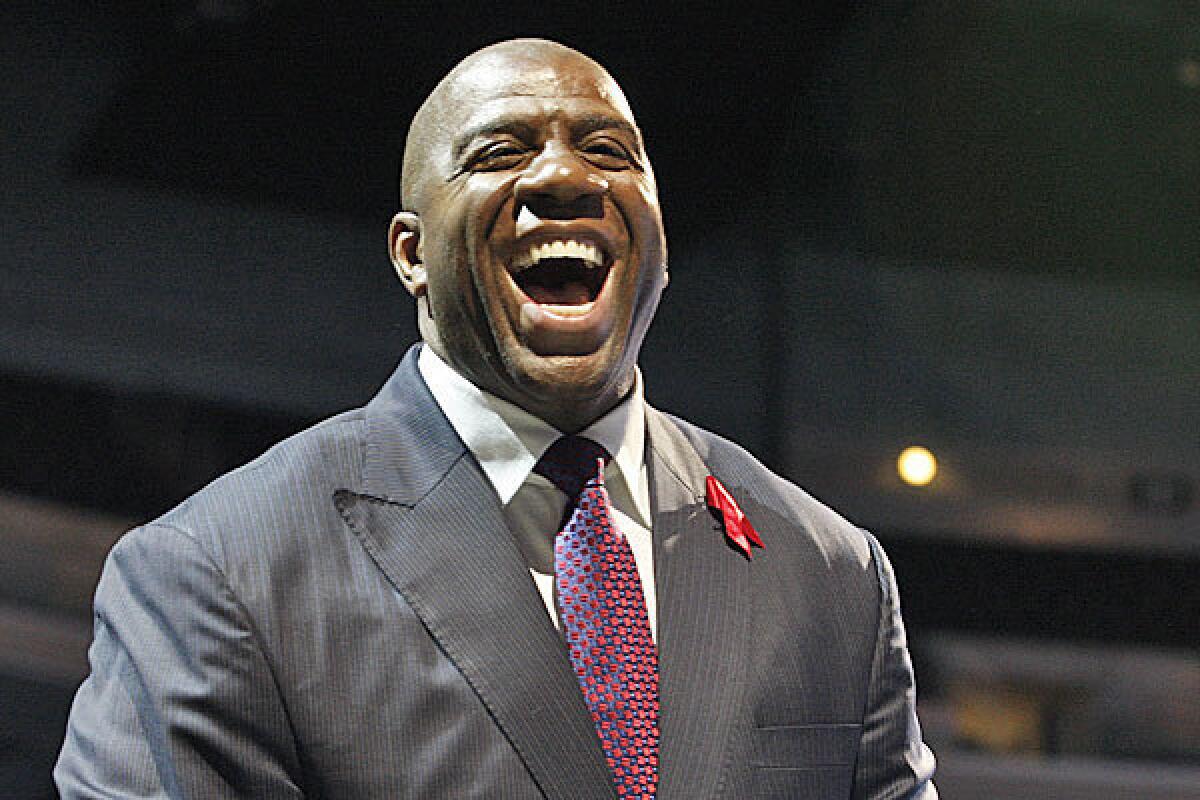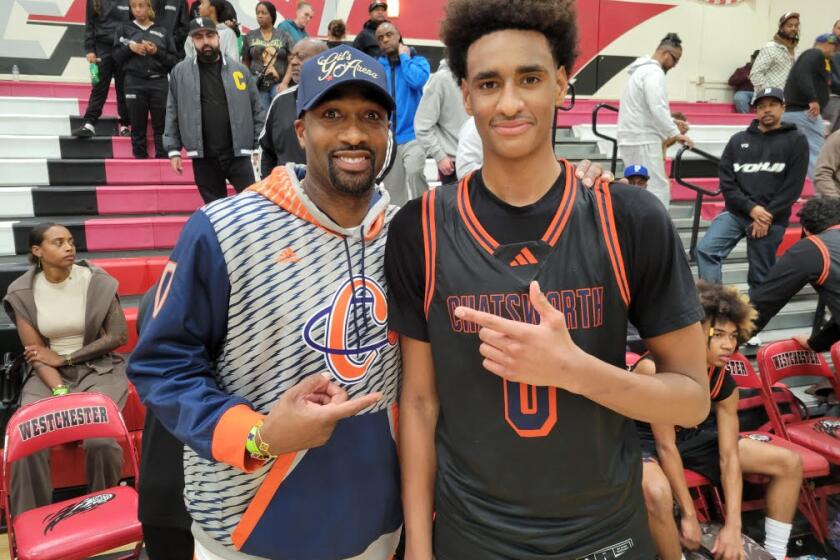Magic Johnson-led group is picked as Dodgers’ next owner

A group led by Lakers legend Magic Johnson emerged Tuesday night as the new owners of the Dodgers, ending months of uncertainty for the storied but troubled baseball franchise.
Johnson, who guided the Lakers to five NBA championships during the “Showtime” era of the 1980s, is a partner in the group along with longtime baseball executive Stan Kasten and movie executive Peter Guber. The controlling owner would be Mark Walter, chief executive officer of Guggenheim Partners, a Chicago-based financial services company.
Walter and McCourt met privately in New York on Tuesday, coming to an agreement only hours after Major League Baseball owners approved three final bidders.
The winning group paid $2 billion for the team -- a record for a sports franchise -- according to an announcement issued jointly with previous owner Frank McCourt.
“I am thrilled to be part of the historic Dodger franchise,” Johnson said in the statement, adding the new owners “intend to build on the fantastic foundation laid by Frank McCourt as we drive the Dodgers back to the front page of the sports section.”
After taking the team into bankruptcy last year, McCourt had sought to retain control of the parking lots surrounding the ballpark. It was announced he and “certain affiliates” of the new ownership will be “forming a joint venture, which will acquire the Chavez Ravine property for an additional $150 million.”
Johnson’s group will control the parking lots for Dodgers games and work with McCourt on any future development.
In the statement, McCourt said the sale “reflects both the strength and future potential of the Los Angeles Dodgers, and assures that the Dodgers will have new ownership with deep local roots, which bodes well for the Dodgers, its fans and the Los Angeles community.”
The announcement Tuesday ended three years of turmoil during which the team’s performance on the field deteriorated and the front office struggled financially.
McCourt chose Johnson’s group over St. Louis Rams owner Stan Kroenke and a partnership of hedge-fund billionaire Steven Cohen and biotech billionaire Patrick Soon-Shiong.
The Dodgers last won the World Series in 1988, their sixth championship in half a century of O’Malley family ownership. The Johnson group would become the Dodgers’ third owner since the O’Malleys sold the team in 1998, following News Corp. and McCourt.
The sale must be confirmed by the court in a hearing April 13. The transaction is set to close by April 30, the same day McCourt must pay his ex-wife $131 million in a divorce settlement.
If the deal closes as expected, the Dodgers would be owned by an entity called Guggenheim Baseball Partners. Kasten, former president of the Atlanta Braves and Washington Nationals, would run the team.
“Stan Kasten is my man,” Johnson told The Times in announcing his bid last December. “He’s a winner. He’s built two incredible organizations, and he’s well-respected. That is what was important to me. I had to get with a winner, a guy who understands baseball inside and out.”
The sales price was nearly three times the previous record price for a baseball franchise, $845 million for the Chicago Cubs in 2009.
The bulk of the funding to buy the Dodgers came from Guggenheim. Walter is not expected to play a significant role in the day-to-day operation of the Dodgers.
Guggenheim President Todd Boehly and Bobby Patton were also listed as partners.
Johnson, who has built a reputation for community involvement since his playing days ended, would own a small stake in the Dodgers, as would Guber, who is co-owner of the NBA’s Golden State Warriors. Johnson and Guber are partners in the Dayton Dragons, a minor league baseball team that has sold out 844 consecutive games, an ongoing record in U.S. professional sports.
Johnson brought five championships to Los Angeles, marrying sports and entertainment as leader of the “Showtime” Lakers in the 1980s. The three-time NBA most valuable player was inducted into the Hall of Fame in 2002, by which time he had launched a business empire that has included movie theaters, banks, restaurants and film production.
Johnson, 52, also has invested in -- and sparked public awareness of -- the fight against HIV, the illness that prompted him to retire from the NBA in 1991.
The announcement of the sale, and next week’s dawn of the new season, could herald brighter days ahead for the Dodgers, a civic treasure battered and bruised for the last three years.
McCourt bought the Dodgers in 2004 for $430 million, with what one of his divorce attorneys said was “not a penny” of his own cash. He nearly doubled team revenue -- from $156 million in 2003 to $286 million in 2009, according to court documents -- and the Dodgers reached the playoffs four times in his first six seasons of ownership.
On the eve of the 2009 National League championship series -- with the Dodgers about to make their first back-to-back NLCS appearances in 31 years -- the McCourts announced they had separated.
The Dodgers lost that series in five games and have not finished above third place in the NL West since.
As the McCourts separated, the attorney for Frank McCourt said his client would remain in control of the Dodgers.
“Speculation about a potential sale of the team is rubbish,” attorney Marshall Grossman said then. “Frank McCourt is the sole owner. He has absolutely no intention of selling this team now or ever.”
Grossman said McCourt had a marital property agreement that specified the Dodgers were his separate property rather than community property.
However, attorneys later discovered three copies of the agreement that said the Dodgers belonged solely to McCourt and three that said they did not. After an 11-day trial in 2010, Los Angeles Superior Court Judge Scott Gordon threw out the deal.
The Dodgers last year endured what might have been the most tumultuous season in club history, which started with San Francisco Giants fan Bryan Stow being beaten nearly to death in the Dodger Stadium parking lot and ended as Major League Baseball accused McCourt of “looting” $189 million in team revenue for personal use.
In the interim, the Dodgers played before a half-empty stadium, with McCourt saying the league had spooked fans by raising unwarranted concerns about stadium security and the league saying fans had refused to support McCourt’s ownership.
McCourt took the team into bankruptcy in June, essentially asking the court to overrule Commissioner Bud Selig and let the Dodgers enter into a multibillion-dollar television contract. Selig had rejected a proposed $3-billion deal with Fox Sports in part because McCourt would have diverted some of the proceeds toward a divorce settlement.
In a Bankruptcy Court filing, attorneys for McCourt alleged Selig responded to the “enormous negative publicity” of the divorce trial by hatching a plan to choke off the Dodgers’ money supply and force a sale of the team.
The league alleged McCourt’s financial mismanagement in asking the Bankruptcy Court to order a sale, even threatening to kick the Dodgers out of the league if McCourt retained control.
McCourt reached separate settlements with his ex-wife and MLB within three weeks of one another last fall. Once McCourt agreed to sell the Dodgers, MLB agreed to let him auction the team and granted him final say in selecting the new owner.
The bidding was spirited, with the new owner in position to negotiate a television contract that might be worth three times as much as the price to buy the team.
Former owner Peter O’Malley tried to buy back the team, and other unsuccessful bidders included such notable figures as Dallas Mavericks owner Mark Cuban; former Dodgers manager Joe Torre and Los Angeles developer Rick Caruso; Memphis Grizzlies owner Michael Heisley; and Jared Kushner, son-in-law of Donald Trump and owner and publisher of the New York Observer.
All had higher public profiles than McCourt and his ex-wife, who introduced themselves to Los Angeles in 2004 as a baseball-loving couple from Boston who would transplant themselves and their four sons to realize their dream of owning a major-league team.
“Family ownership has returned to the Dodgers,” Frank McCourt said that day.
Five years later, Frank fired his ex-wife as the Dodgers’ chief executive in a termination letter that cited “insubordination, non-responsiveness, failure to follow procedures and inappropriate behavior with a direct subordinate,” a reference to an affair he alleged she had with her driver.
When Jamie McCourt initiated the divorce proceedings -- one week shy of what would have been the couple’s 30th anniversary -- she revealed the details of a lavish lifestyle financed by the couple’s only source of revenue: the Dodgers.
“Frank and I enjoyed the many perquisites and benefits that come with owning a Major League Baseball team,” she wrote in a court declaration.
In court documents, Jamie McCourt wrote of combined salaries of $7 million a year, plus $46 million to buy side-by-side oceanfront estates in Malibu, $27 million to buy side-by-side homes near the Playboy Mansion, additional properties in Massachusetts, Montana, Colorado, Wyoming and Mexico, $400 dinners and $1,000-a-night hotels, private jet travel around the world, and even house calls from hairdressers and makeup artists.
bill.shaikin@latimes.com
twitter.com/BillShaikin
david.wharton@latimes.com
More to Read
Go beyond the scoreboard
Get the latest on L.A.'s teams in the daily Sports Report newsletter.
You may occasionally receive promotional content from the Los Angeles Times.












